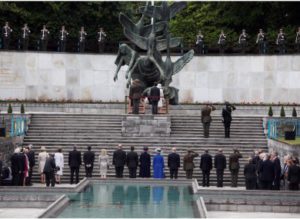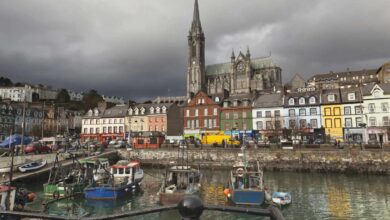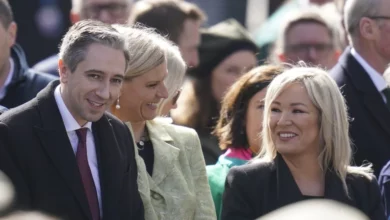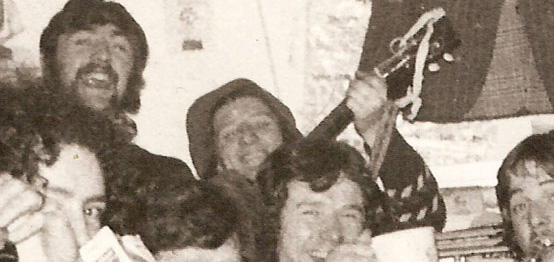Visita della regina Elisabetta rinsalda Unione
Queen’s visit cemented the Union
Alex Kane, Monday 23 May 2011
 WELL, well, it’s been a long time coming, hasn’t it? What would she look like? What would she be wearing? What would she say? Didn’t she look very relaxed and comfortable with President McAleese at the Dublin Castle dinner; although in the back of many minds there hung the question of whether her presence signalled a real change in the nature of the relationship between them, or if it was all just for show.
WELL, well, it’s been a long time coming, hasn’t it? What would she look like? What would she be wearing? What would she say? Didn’t she look very relaxed and comfortable with President McAleese at the Dublin Castle dinner; although in the back of many minds there hung the question of whether her presence signalled a real change in the nature of the relationship between them, or if it was all just for show.
One always needs to be careful about over-egging the historical, political and psychological significance of a particular event, yet it seems to me that the ‘Irish question’ – which has bedevilled British/Irish relationships for centuries and has been the longest running political sore of the Queen’s reign – has now been resolved to the satisfaction of both governments, as well as the satisfaction of the majority of people in the Republic and Northern Ireland.
That’s no mean achievement. The British/Irish squabble has been so difficult to resolve precisely because it was more like a family at war than a revolt by colonialists, or even the sort of ‘European’ war that used to be one of the fixed points of geo/political relations between Britain and a host of countries beyond the English Channel. The British and Irish intermixed and mingled like no other nations on earth, leading to torn and confusing loyalties and, more interestingly, a genuine confusion over identities. But, as I noted on Wednesday, it seems to me that we have reached the ‘Casablanca moment’ and the opportunity for the ‘beginning of a beautiful friendship’.
Of course, in one sense it doesn’t really matter how good the diplomatic links between London and Dublin have become: for the one thing they will be keen to avoid is the possibility that the ‘Irish question’ will simply be replaced by the ‘Northern Ireland Question’. The SDLP and Sinn Fein are no less united Irelanders than they were before the visit, and the DUP and UUP are no less pro-Union. So it seems reasonable to conclude that politics on this side of the border will continue as usual if left alone.
Apart from a handshake in Cork, Sinn Fein (along with some elements of the GAA in Northern Ireland) boycotted – an ironically appropriate term in the circumstances – the visit. Gerry Adams treated us to a particularly convoluted piece of nuanced begrudgery and topped it off with the comment that ‘the British government must play a full role…in encouraging an end to division in Ireland and the unity of our people and country’.
Sinn Fein won’t be happy. Five years away from the centenary of the Easter Uprising and a British monarch is back in Dublin and an honoured guest at Croke Park. The visit dominated the Irish media, with RTE clocking up huge audiences, while newspapers put on sales. And apart from the very, very small groups of protestors, it seems as though the vast majority of people had absolutely no concerns whatsoever about the fact that the Queen’s visit was only possible because there was no longer an Irish claim on her territory. Put bluntly, most people in the Republic don’t give a damn about Irish unity.
Indeed, Sinn Fein’s discomfort was neatly summed up in a letter to the Irish Times last Thursday: ‘While her visit is seen as a coming-of-age for the State and in many respects this holds true, one cannot but feel that the events of the last few days have only further endorsed the partition of this island. The wedge between Southern and Northern nationalists has deepened. As the Republic pursues its independence and rightly so, our Northern nationalist brethren are increasingly being cast adrift. There is a noticeable arrogance in many Republic of Ireland citizens towards their Northern Ireland counterparts. Events of the last few days would seem to only heighten this – and strengthen the Union.’
Regular readers will know that I have been banging on for years that a united Ireland isn’t coming in my lifetime, let alone the lifetime of my children. So Adams and McGuinness, both of whom are a few years older than me, will surely be wondering if the decades of safe-houses and terrorism were worth it. The Union is stronger than ever before; British-Irish relationships are better than ever before; McGuinness is joined at the hip to a DUP that has increased its lead over Sinn Fein; and Queen Elizabeth is a welcome visitor on both sides of the border.
The political/electoral/media consensus across the UK and the Republic is for the maintenance of the status quo and that means leaving Northern Ireland exactly as it is. So in my view unionism – with a big U – is stronger today than it has been for decades. Sinn Fein (as well as the SDLP) will continue to promote eventual unity but I suspect that both of them now recognise that the unity project has been dealt a near fatal blow by recent events – and not just the Royal visit.
And I also think that if unionism does get its act together and begins to deliver good local government, really promotes the socio/economic benefits of the Union and builds on the excellent fence-mending started by the Queen’s visit, then it will succeed in lessening the appeal of Irish unity within ‘soft’ nationalism in Northern Ireland.
I noted earlier that politics here will continue as usual if left alone. That would be a bad thing in its own right, but it would also represent another missed opportunity for unionism. If the case for Irish unity has diminished since 1998 (and I think it has) then it surely makes sense for unionism to display more courage and confidence? This is authentic mammon versus bogus god territory and the pro-Union family needs to understand the strength of its current position.
The peace process was always a five act opera: get everyone to acknowledge that a deal was possible; get the so-called political extremes to sign up to it; secure support from voters on both sides of the border; build a devolved system that would last; and, finally, create new era, post-conflict politics. Well, the fifth act has been reached and unionism has the advantage. Let’s not blow it this time!





